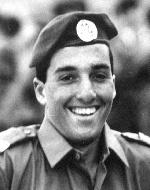Ben Tovah and me. He was born on the 17th of Adar 5736 (February 17, 1976) at Tel Hashomer Hospital in the seventh month of pregnancy. After difficult weeks at the hospital, Kobi developed well, strengthened and joined his parents and older sister Tali in Ramat Gan. When he was three, the family moved to Ramat Hasharon, the city where he grew up and grew up. Kobi was a child full of joie de vivre and human warmth. When he grew up knowing to live the moment to the end, without giving up what was important to him. Kobi took everything easy and adopted an optimistic vision, accompanied by a cynical and controlled sense of humor. When he was twelve, his sister Shani joined the family. Kobi studied in Ramat Hasharon – he began at Kiryat Ye’arim Elementary School, went on to junior high school “Neve Magen” and graduated from the Rothberg High School. Throughout his youth, Kobi was an active member of the Hanoar Haoved Vehalomed movement in Ramat Hasharon, first as an apprentice and later as a mentor and supervisor of the instructors, and devoted many hours to organizing the various activities within the movement. Alongside the activity in the movement, Kobi was active in snow skiing and sports related to the sea he loved and spent many hours in. In his youth, Kobi also studied guitar lessons. When Kobi was seventeen, his mother, Tova, died after five years of fighting cancer. His mother’s untimely death had profoundly affected him, his rapid maturation, the new division of roles in the family, and the responsibility he took upon himself. Before his enlistment in the IDF, Kobi was identified as having particularly high data, but insisted on serving in the front as a combat soldier in all respects, despite the fact that he was given the opportunity to serve close to home.In August 1994, Koby enlisted in the IDF, Was stationed in a company in Judea and Samaria. After a year of service in which Kobi was assessed by his commanders as an outstanding soldier, an officers’ course was recommended. In December 1995 Kobi began the course and when he finished he was placed, at his request and despite the possibility that he was allowed to serve close to home, on the Lebanese front. For eight months Kobi commanded an observation unit at the “Pumpkin” outpost. The commander of the unit in which he served wrote: “At the end of the officers’ course, Kobi was asked by the unit commander to return to the Lebanese company and command a ‘pumpkin’ observation.” Kobi agreed to take up the position despite the difficulties at home, And the team’s work was carried out quietly and thoroughly, and was done in a good atmosphere, with the desire to help the soldiers who had difficulties, Some of whom came to the ‘pumpkin’ position. “Kobi was always striving for more activity, more work and planning what to do next D. ” Two weeks before his twenty-first birthday, on the evening of the 28th of Shvat 577 (February 4, 1997), the helicopter disaster occurred when two Yasur helicopters collided over Moshav Shear Yashuv. The seventy-three fighters, who made their way to operational activity in Lebanon, were killed, among them Kobi. He was twenty-one years old when he fell. After his fall he was promoted to lieutenant. Kobi was buried in the civilian cemetery in Warsaw alongside his mother, Tova. Survived by a father and two sisters. His friends in the “Pumpkin” team wrote: “Kobi, you played for us dedication, diligence and determination, but mainly the human image of you. The memory of Kobi was immortalized in a song written by Dudu Dotan, composed by Hanan Yovel and recorded on a CD. “And on the cold night, Mother found out that Kobi was sleeping, with her again, right next to her, just like the birth.” She asked her, “How did he get here?” The two? / Tali and Dad / and what about the grandfather”And what will all the uproar / even bother the prime minister?” And only after she asked, and only after she checked / sent him a hand and hugged him and gave him her good smile, because he was never so close. His sister Tali wrote: “Kobi is the opposite of death / Kobi is the joy of life, to live the moment to the end, without giving up what is important to him / Kobi is to take everything easily, to be optimistic and cynical at the same time. / Kobi is the embodiment of life / Kobi, I miss you so much for your life, for your life, for you! “From the words Tali delivered on the anniversary of Kobi’s fall: A full year of going to bed and hoping that the nightmare will end tomorrow. / A whole year of getting up in the morning and not sleeping for a whole year. To believe that it happened to us and it’s real, and it’s so irrational. / And here I find myself eulogizing myself, my pain, my loneliness and I really want to talk about you, about Kobi that you and you are the living, laughing, loving part , Who is worried, sad, happy, raving, you who go with the guys to Eilat at every opportunity. / But from that terrible night you are your part of me that he hurt so much because you do not continue to fill it in your life. And Kobi without a life is not Kobi. / Apparently your obituary, Kobi, is the obituary of your part in each of us /, there’s Kobi’s father, Kobi’s second, Kobi’s Ran and Gilad, But this part is no longer filled with life and it hurts, and again I am eulogizing us, because what is left to me is your parts in each of us / so apparently Kobi can not eulogize you because you can not be the dead part because you are the living part.
